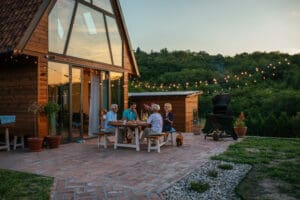Southern Oregon is known for its stunning landscapes and vibrant communities, bringing an influx of visitors to the area every year. If you’re a landowner thinking of opening an Airbnb to accommodate these visitors, it’s essential to think beyond the financial benefits and fully understand the regulations and potential challenges that come with running an Airbnb on your property. Here are some of the land use issues you’ll need to consider to run an Airbnb on your property.
 Local Regulations
Local Regulations
The first step in determining whether you can run an Airbnb on your property is to understand the local regulations and zoning laws in your area. These rules can vary significantly between different cities and counties in Southern Oregon, so it’s crucial to check with your specific local government for the most up-to-date and accurate information regarding short-term rental requirements in your area. Here are some common considerations:
- Zoning Laws: Check if your property is in a zone that permits short-term rentals. Some areas have restrictions based on zoning classifications, and certain residential zones may not allow commercial activities like Airbnb.
- Licensing and Permits: Many cities and counties require short-term rental operators to obtain specific licenses or permits. This might include a business license, a short-term rental permit, or both. Medford, for example, requires all bed and breakfast and short-term rental operators to have a business license. Be sure to understand the application process and fees involved.
- Taxes: You may be required to collect and remit local lodging taxes. Airbnb usually handles this for you in the state of Oregon, but it’s essential to verify the specifics for your location. Always consult with your trusted tax professional or CPA for tax advice.
Compliance with State Laws
In addition to local land use regulations, you’ll need to comply with Oregon state laws related to operating short-term rentals. Here are a few examples:
- Operational Guidelines: You’ll need to familiarize yourself with local regulations regarding noise, parking, occupancy limits, and prohibited activities such as events or parties.
- Safety Requirements: Your property must meet all local safety and health regulations. This may involve inspections to verify compliance with housing codes, installing smoke detectors and fire extinguishers, and meeting certain cleanliness standards.
- Insurance: Many cities require you to maintain liability insurance for your short-term rental, so you’ll need to ensure that your homeowner’s insurance policy covers short-term rentals. Airbnb offers Host Protection Insurance, but it might not cover all scenarios.
HOA and Lease Agreements
While these don’t fall under land use regulations, HOA rules or lease agreements are similar restrictions impacting how you can use your property. If your property is part of a Homeowners Association (HOA), review their rules and covenants. Some HOAs have strict guidelines prohibiting short-term rentals or imposing additional requirements. Similarly, if you’re renting your home, your lease agreement may prohibit subletting or short-term rentals.
You’ll also want to consider neighbor notification. Some cities require you to notify neighbors within a certain radius of your property about your short-term rental operation and provide them with contact information.
Richard Stevens & Associates can help you understand land use provisions related to your property.
Running an Airbnb on your Oregon property can be a lucrative and enjoyable venture if you effectively navigate the legal and practical considerations. By understanding and complying with local and state regulations, maintaining your property, and providing excellent service, you can create a successful and sustainable short-term rental business. Our team at Richard Stevens & Associates can help you understand the land use provisions related to your property before you invest in a new venture.
For more detailed information about land use considerations impacting your property, you can always reach out to our team at Richard Stevens & Associates. We’re your local experts on land use planning, including zoning codes and regulations.

 Local Regulations
Local Regulations
Leave a Reply